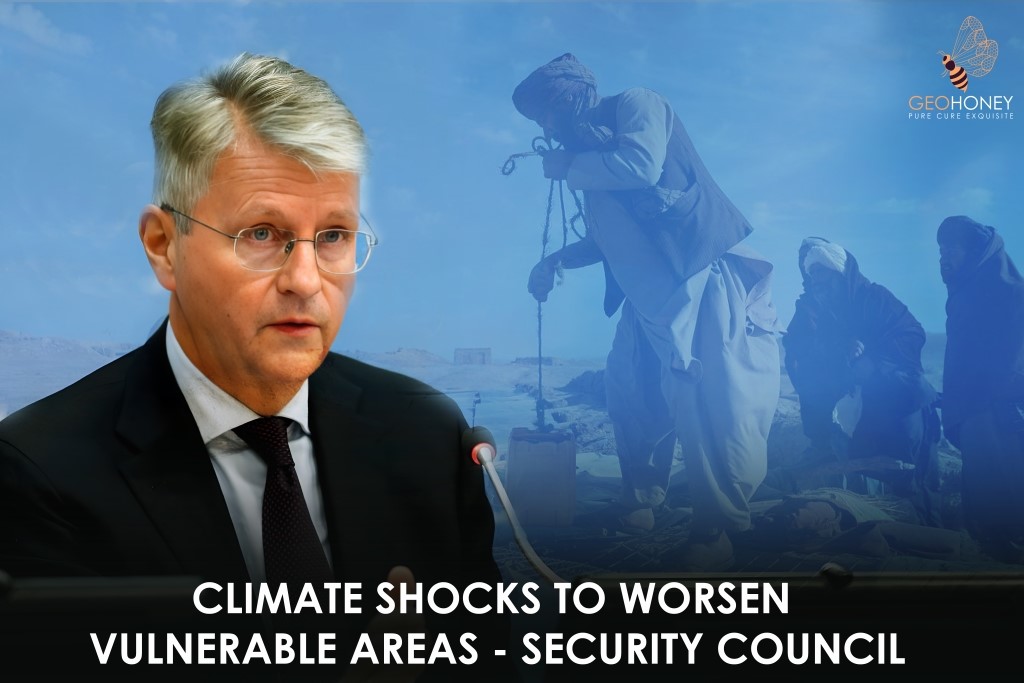- Tokyo: 08:52
- Singapore: 07:52
- Dubai: 03:52
- London: 23:52
- New York: 18:52
Climate Shocks are Expected to Exacerbate Existing Vulnerable Locations, According to the Security Council

With an estimated 3.5 billion people living in "climate hot spots," related peace and security threats are only going to intensify, according to UN Under-Secretary-General for Peace Operations Jean-Pierre Lacroix, who warned the Security Council on Tuesday that action is needed to avert ever-worsening effects.
Climate shocks are deteriorating security conditions from Afghanistan to Mali, and UN peacekeeping missions are adapting by decreasing their carbon footprint and tackling a slew of linked effects.
"Given the growing links between climate change, peace, and security, as well as broader changes in conflict dynamics in the areas where we work," he stated.
He stated that the most recent Intergovernmental Panel on Climate Change (IPCC) assessment report revealed that climate change and other threats such as biodiversity loss and violent conflict will increasingly interact.
More than 70 speakers, including former Colombian President and Nobel Prize laureate Juan Manuel Santos, expressed perspectives on the links between climate change and worsening security at the Security Council's second formal meeting in 2023 to discuss this issue.
The relationship between climate and security
Mr. Lacroix provided an assessment of current activities, stating that most UN peacekeeping operations have encountered increased hazards and political obstacles in recent years.
"Cross-border challenges, environmental degradation, and extreme weather events, exacerbated by climate change," he continued, "are increasingly challenging our ability to implement our mandates." "We already see a strong correlation between Member States facing fragility and those confronted by climate change."
Afghanistan, Central African Republic, Democratic Republic of the Congo, Haiti, Mali, Somalia, Sudan, South Sudan, and Yemen host a UN field mission, he said, emphasising that the majority of UN peace operations are deployed in contexts that are both highly climate vulnerable and characterised by high levels of gender inequality.
While UN field operations do not have the "ultimate solution" to climate change, he claims they are "profoundly" influenced by it.
There are two weaknesses
"Our missions witness first-hand the dual vulnerabilities posed by climate change and insecurity," he said, citing Mali and South Sudan as examples.
Priorities for action in UN field missions, he added, include investing in capacities to anticipate and address climate and security linkages, promoting the mutual advantages of climate action and making environments safer, and ensuring that the missions do not become part of the problem.
"Guided by the Environmental Strategy for Peace Operations, the United Nations is progressively introducing renewable energy solutions, reducing our environmental footprint while also minimising the security risk for fuel convoys," he said.
Redoubled efforts
Noting that renewable energy sources would generate 6% of the electricity used by UN peacekeeping operations in 2021 and 2022, he welcomed new initiatives such as the Nepal-United States partnership to deploy a large-scale solar hybrid system in Rumbek, South Sudan, and the United Arab Emirates and Norway launch of the Energy Compact in Peace Operations.
"The deployment of dedicated capacity on climate, peace, and security in a growing number of field missions has been a game changer," he says. "Integrating climate considerations into their work has strengthened missions' abilities to carry out the Council's mandates."
Mr. Lacroix stated that the 2023 UN Peacekeeping Ministerial Meeting, which will be held in Ghana in December, will provide additional opportunities to strengthen efforts by generating pledges that meet needs ranging from specialised capabilities to equipping partnerships in critical areas such as the environment.
"Together, we can create a future where our efforts in conflict prevention, peacemaking, peacebuilding, and peacekeeping are reinforced and complemented by our commitment to addressing the climate crisis," he said.
Demand that the Security Council act
Former Colombian President and Nobel Laureate Juan Manuel Santos has urged the Security Council to take action.
"We are at a point in history when the world risks dividing into blocs that compete for power and supremacy over one another, rather than cooperating to address the unprecedented challenges and existential threats that we all face," he said.
Despite some Council members' wish to approach climate change and security as separate issues, the repercussions of climate change and war merge in the real world, he said.
"Climate change exacerbates threats to human security, and war damages nature and the environment in numerous ways, from the destruction of dams - just look at Ukraine - to attacks on oil pipelines and agricultural land that sustains rural communities," he said.
He suggested that the Security Council step up and play its part in addressing the unprecedented challenge of climate insecurity, working with other parts of the UN and other international institutions to find sustainable and just solutions, including integrating climate more effectively into UN operations on the ground, attaching more climate and security advisors to peacekeeping missions, and using climate forecasting as part of the UN's prevention strategy.
"There cannot be peace without sustainable development, and there cannot be sustainable development without peace," he explained. "It's really as simple as that."
He believes that peace can only be sustained if the woods, soils, and rivers on which communities rely are protected and managed sustainably.
"We need bold policy action," he declared. "We must redouble our efforts not only in mitigation and adaptation, but also in nature-positive solutions such as conserving high-integrity forests, peatlands, coral reefs, and other ecosystems that provide clean air and clean water to humanity."
He urged Council members to establish common ground, engage in constructive discourse, and work together, saying there is only one way forward: "Unite, cooperate, or we will all perish."
Source: news.un.org




indeed there cannot be peace without sustainable development, and there can not be sustainable development without peace, these two should be present to implement what must be needed.